 |
eXtended
Range NIR Spectrometer
|
|
- Measurements
from 900-2300nm (0.90-2.30 um)
- For NIR measurements
and applications requiring wide spectral range
- 512 or 1024
pixel extended range InGaAs Photo Diode Array
- Integrated
2-stage thermo electric cooler set to operate at -30 °C
- Increased
air flow and specialized heat sink for added stability
- Applications
include absorption, transmission, and laser measurement.
|
|
|
|
|
|
|
|
StellarNet’s
high performance RED-Wave-NIRX-SR Spectrometers cover the
NIR wavelength range from 900-2200µm in one unit. The spectrometers
are exceptionally robust with no moving parts and are packaged
in small rugged metal enclosure (2.75” x 4” x 6”)
for portable, processes, and lab applications. The InGaAs detector
is a Sensors Unlimited linear photo diode array with 512 pixels
(1024 optional), 25µm by 250µm tall to provide best
signal performance. The detector has an integrated two-stage thermo
electric cooler (TEC) maintained at –20 °C, stabilized
within +/-0.1°C. The RED-Wave-NIRX-SR-InGaAs spectrometers
use single strand SMA 905 fiber optic input.
Ruggedized
– The detachable spectrograph assembly and control electronics
are protected inside a rugged metal enclosure, suitable for portable,
process, lab, and field applications.
Onboard Memory
with pre-set calibrations, spectrometer settings, and snap shot
memory to provide an instantaneous spectral image from the InGaAs
array.
High Speed
Electronic Interface can be attached directly to a computers
USB port for high speed data transfer. Options for Wifi/ethernet
communication available as well as other interfaces.
NIR Applications
include chemical absorption, moisture analysis, transmission of
filter and optical components, and high power radiometric measurements
such as laser characterization.
|
| |
|
|
|
|
|
Model
|
Number
of Elements
|
Wavelength
Range (nm)
|
Grating
lines/mm
|
Spectral
Range
|
Dispersion
nm/Pixel
|
Estimated
spectral resolution
|
| NIRX-SR |
512
|
900
- 2300
|
300
|
1400
nm
|
5.3
|
<13
nm
|
| NIRX-SR |
1024
|
900
- 2300
|
600
|
1400
nm
|
2.7
|
<7
nm
|
|
|
|
|
|
Specifications
|
Zero
defect 512 detector RED-Wave-NIRX-SR Spectrometer $18,995 /
€15995 |
| Dynamic
range: |
4000:1
with 5 decades |
Dimensions:
|
150 x 100 x 68.8 mm |
| Optical
resolution: |
13 nm with
25µm slit |
Power
consumption: |
2 A @ 5 VDC |
| Detector
type: |
cooled InGaAs
PDA, 512 or 1024 pixels |
Interface:
|
USB-2 and
Parallel |
| Detector
range: |
0.9 - 2.3
µm (900-2300nm) |
Detector
Integration: |
1ms to 250ms |
| Pixel
size: |
25 x 500
µm |
Slit
size options: |
25 µm
for optimum performance |
| Pixel
Well Depth: |
130 x 108
electrons |
Operating
systems: |
Win XP, Vista,
7, 8, & 10 |
| Selectable
Well control: |
130 x 108
or 5 x 106 electrons |
Software
included: |
SpectraWiz
program & apps |
| Signal
to Noise: |
12000:1 with
2X TEC cooling |
Also
free programs for: |
LabView,
Excel+VBA, Delphi |
| Digitizer:
|
16-bit |
|
|
|
| |
| RED-Wave-NIRX-SR
Sample Spectra |
|
| |
|
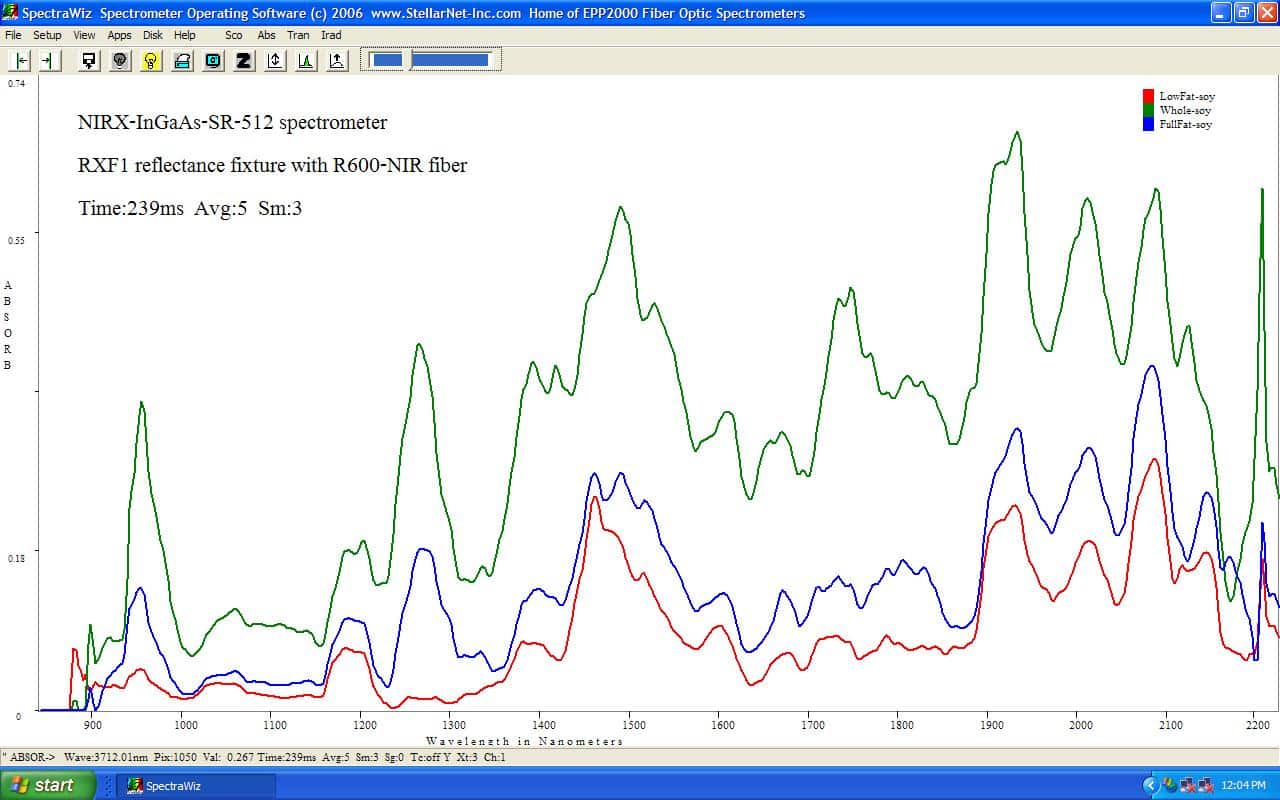 |
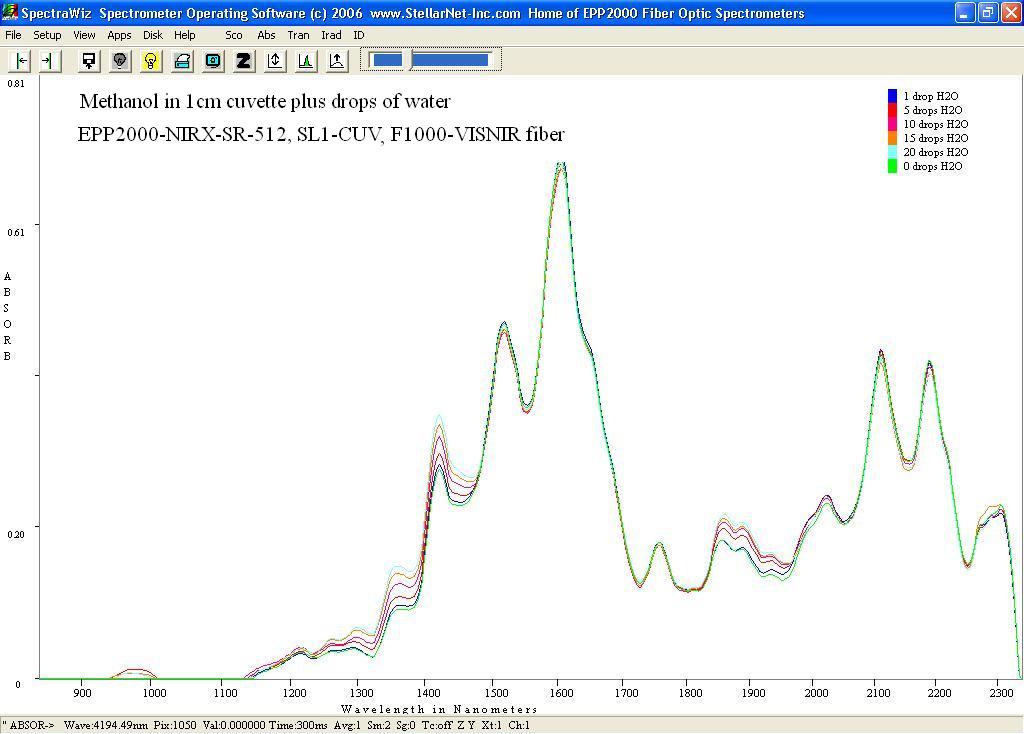 |
RED-Wave-NIRX-SR InGaAs 512 pixels spectrum showing spectral
characteristics of Tylenol, Excedrin PM, and Ibuprofen tablets. Often
NIR spectroscopy is used as a non-contact method to distinguish between
coatings.
|
RED-Wave-NIRX-SR spectrometer with SL1-CUV tungsten halogen
lamp with integrated cuvette holder, and a F1000-VIS-NIR 1000um diameter
fiber optic cable measuring the NIR absorption of methanol in water.
|
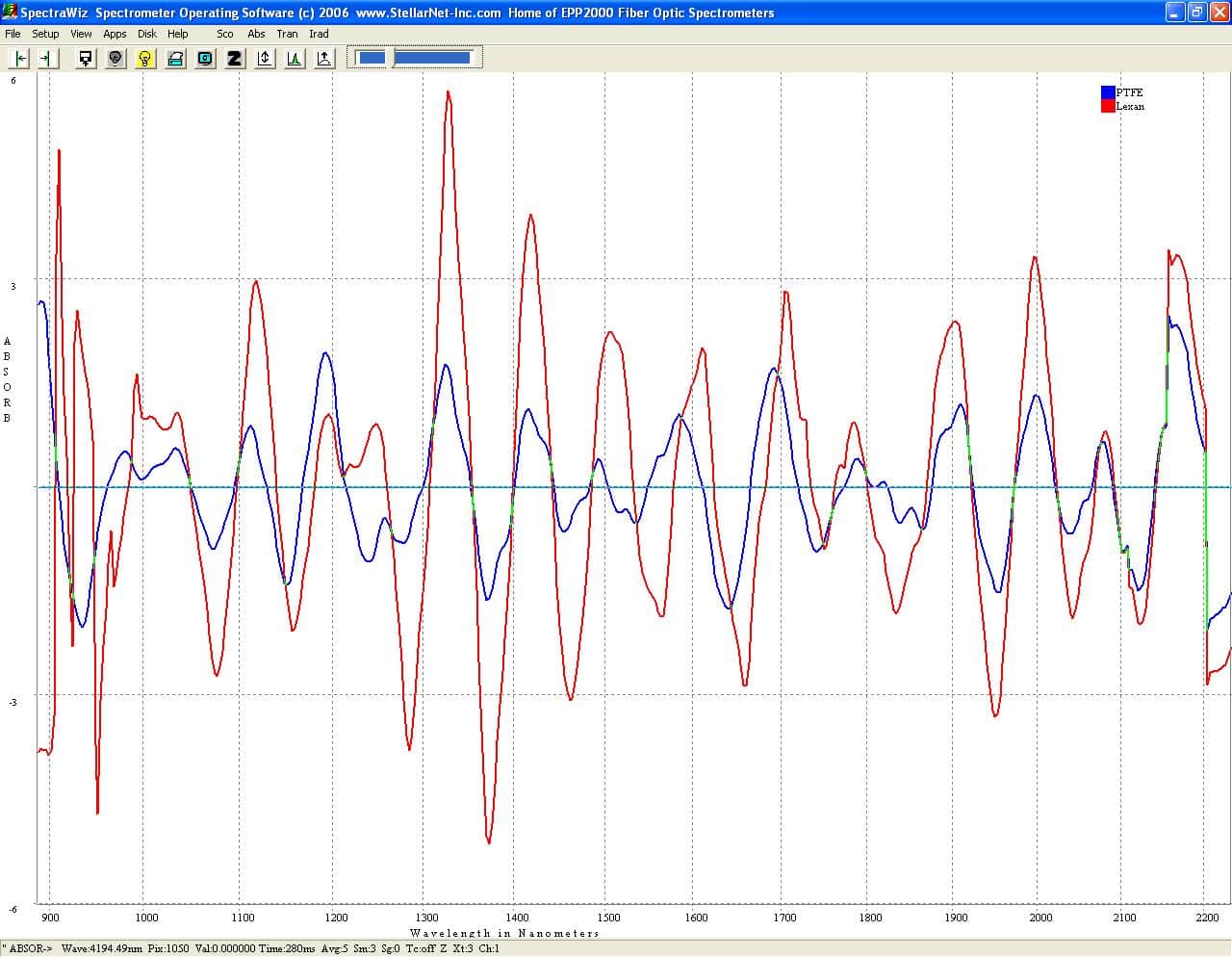 |
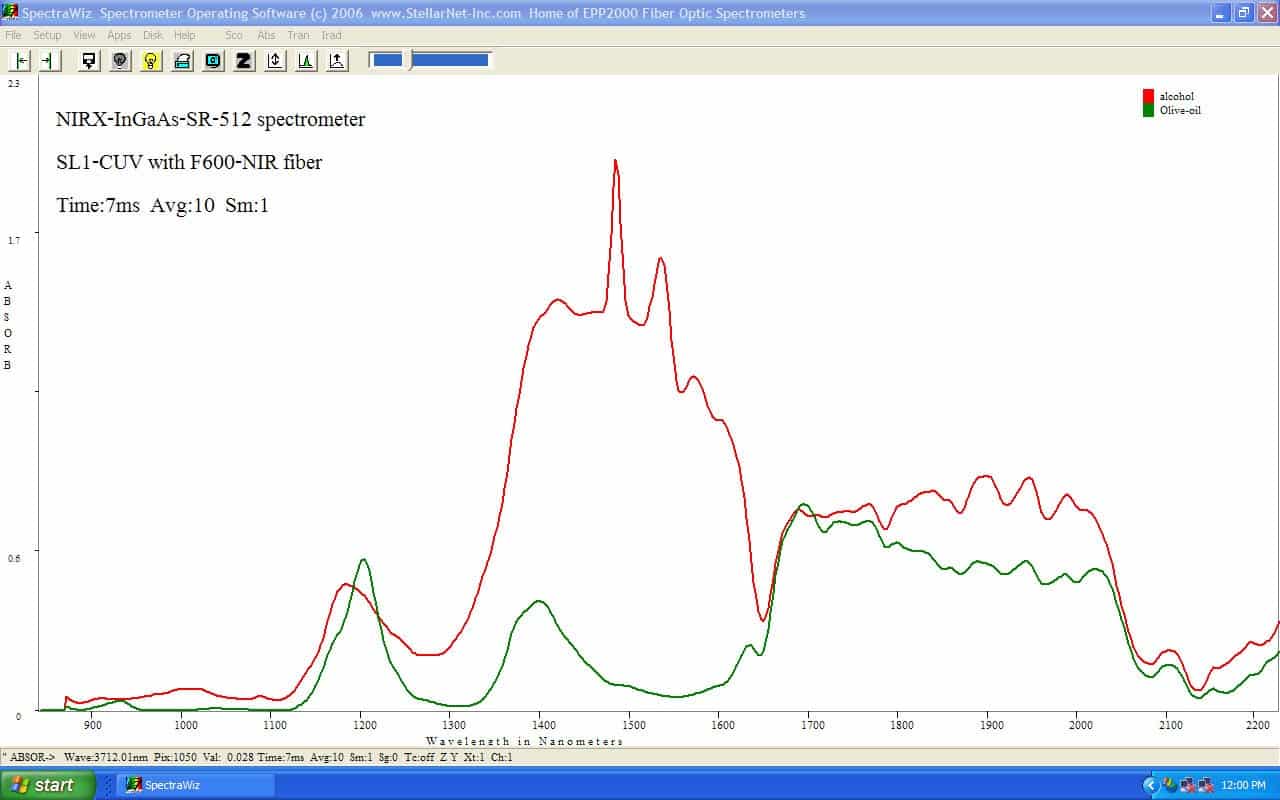 |
RED-Wave-NIRX-SR spectrometer with SL1 tungsten halogen lamp,
TXF-4 transmission fixture, and two F600-VIS-NIR 600um diameter fiber
optic cables measuring the transmission through PTFE and Lexan plastics.
Above SpectraWiz spectroscopy software displays 2nd derivative spectra
in real time.
|
RED-Wave-NIRX-SR spectrometer with SL1-CUV tungsten halogen
lamp with integrated cuvette holder, and a F600-VIS-NIR 600um diameter
fiber optic cable measuring the NIR absorption of oil and alcohol
solutions.
|
| |
|
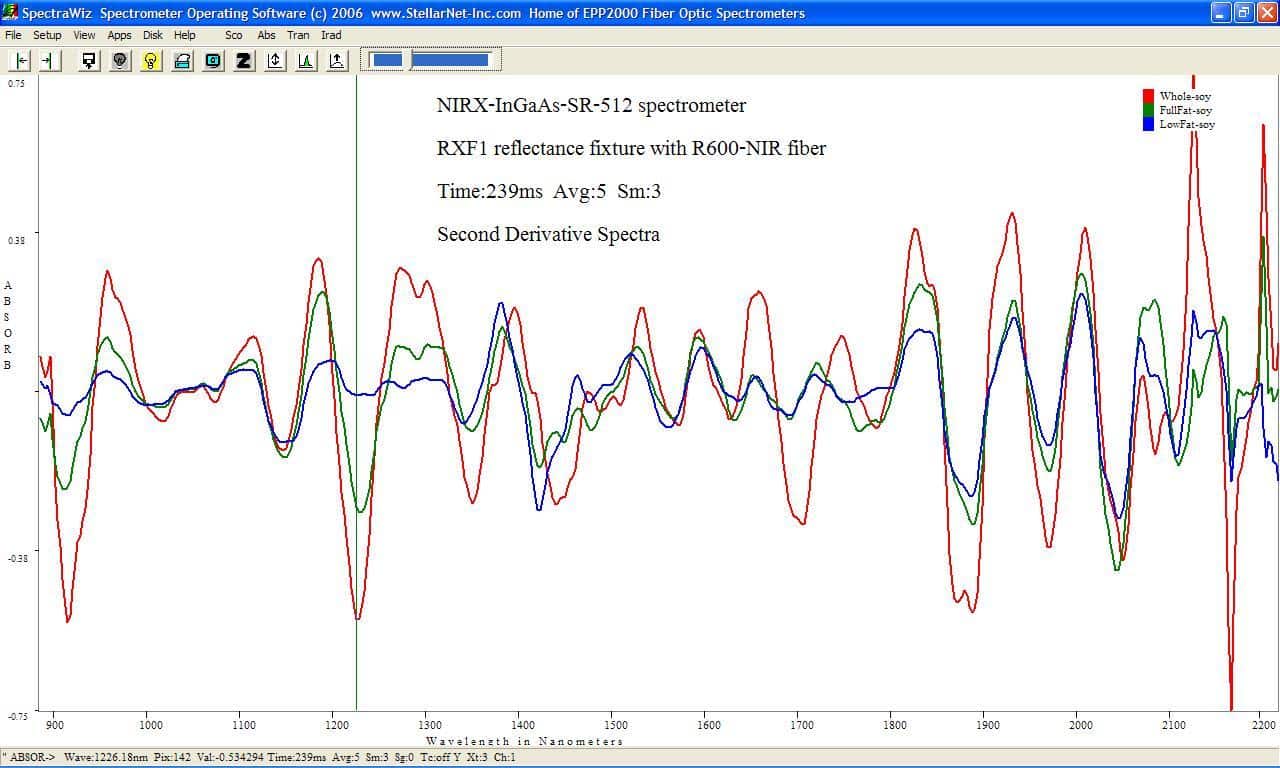 |
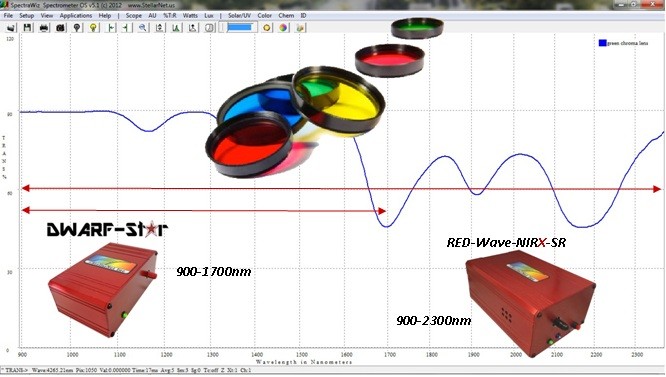 |
RED-Wave-NIRX-SR spectrometer with RFX1 reflectance fixture
plotting NIR 2nd derivative spectra of soy products with varying fat
content.
|
Lens, filters, films, coatings, and plastics sometimes will have interesting
characteristic fringe patterns in the far NIR. Be sure to test your
samples!
|
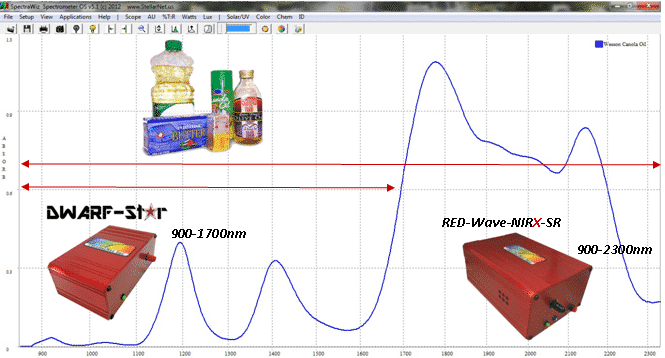 |
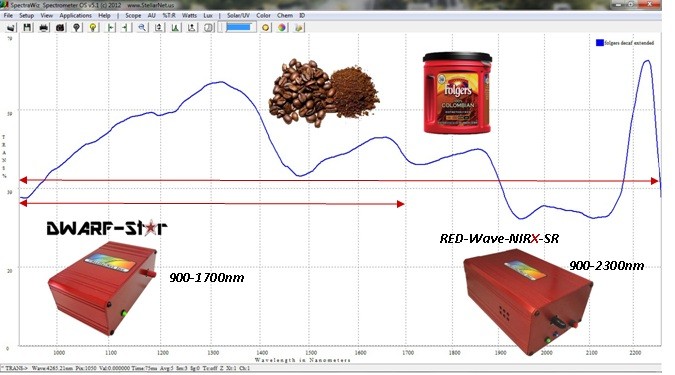 |
Fats and oils constitute the main source of energy and essential fatty
acids in the human diet. Additionally, fats and oils function as lubricants
in equipment and carriers of fat-soluble vitamins and pigments. Exploring
the NIR past 1700nm allows us to identify some of the more important
spectral feastures of fats and oils. Above is a spectrum of the StellarNet
low dark Noise NIRX (900-2300nm) showing important spectral features
past 1700nm such as Fatty Acids absorbance bands at 1750nm and oil
saturation absorbance at 2100nm.
|
Coffee in addition to many other agricultural products shows very
important spectral characteristics past 1700nm. Commercial coffee
is mainly made up of two main blends, Arabica and Robusta. Main distinguishing
absorptions can be found from water content (1466nm and 1962nm) and
lipids. NIR spectroscopy can be used for classification as well as
blending. Also, caffeine and dry matter content can be determined.
For food quality control and identification of adulterants it is very
important to test all parts of the NIR region.
|
| RED-Wave-NIRX-SR
Options |
Dual System
Configurations
All NIRX-SR units can be coupled with StellarNet’s BLACK-Comet
or UVN-SR units to cover the entire 200-2300nm range. Coupling
the units can provide you with quick analysis of color in the
visible spectrum and additionally compound analysis though compound
fingerprint identification in the near infrared spectrum.
JACK 1-IN
Trigger
Add an external TTL trigger input to enable spectrometer scan
Multi-Spectrometer
Configurations
Units may be daisy chained via USB-2 hub allowing simple configurations
for dual and multi-beam process applications. 8 spectrometers
can be operated at once!
|
| RED-Wave-NIRX-SR
Interfaces |
Interface
The system includes a high speed plug & play interface using
USB-2 connection.
|
| Systems
/ Applications |
|
NIR Applications
include chemical absorption, moisture analysis, transmission of
filter and optical components, and high power radiometric measurements
such as laser characterization.
|
|

